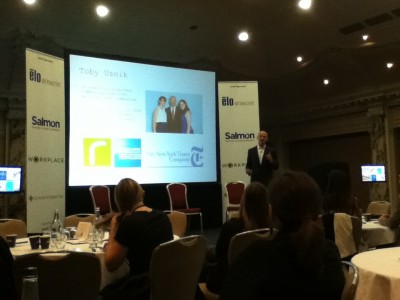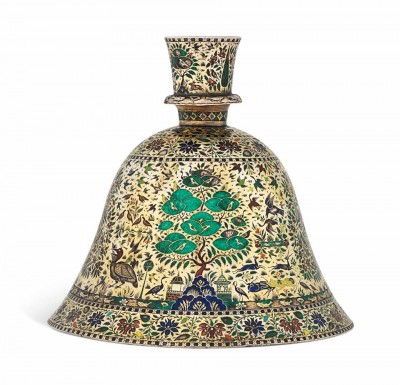 “Vue sur L'Estaque et le Château d'If" from Christie's auction
“Vue sur L'Estaque et le Château d'If" from Christie's auction
LONDON – Corporate social responsibility may be about relationship building rather than transactions, but that makes it more important for brands, not less, according to Christie’s executive at Luxury Interactive Europe 2015 Oct. 27.
The speaker offered a number of tips for brands looking to improve or get started on CSR, offering a number of Christie’s stories as support. In addition to quality craftsmanship and great service, being a luxury brand means using a highly visible and admired position to fulfill moral and ethical responsibilities.
“There are things that are bigger than any duopoly or any marketplace or any sector,” said Toby Usnik, chief corporate social responsibility officer at Christie's.
“In your own industries, your own businesses, there are going to be times when you want to compete and need to compete with the others," he said. "But then there are times when the issues, the mega-trends and the opportunities are bigger than any one brand.”
Working together
Christie’s is small in number, with about 2,200 employees, but is big in fundraising for causes and engaging in philanthropy and volunteerism. The auction house’s CSR platform, Art & Soul, focuses on philanthropy, employee engagement, sustainability and cultural stewardship.
Toby Usnik speaking at Luxury Interactive Europe 2015
The first tip is an obvious, even tired one, but it rings true nonetheless. As with anything else a brand does, authenticity is key.
“I know you hear that a lot and think it’s overused, but in CSR you really have to believe in what you’re doing,” Mr. Usnik said. “If you don’t, don’t even start.”
A brand must also reconcile its own values and DNA with mega-trends, such as water shortage, income disparity, climate change and access to education. For Christie’s, this means focusing on cultural property.
Although art can sometimes appear removed from the larger world, it is in fact rooted in larger issues. Currently, ISIS is destroying the cultural artifacts that link people to their past, just as the Nazis did before them.
Christie's charity acution promotion
“We believe we give people access to art and culture and we can start, through our volunteer programs in particular, to give disadvantaged young kids in Hong Kong and in London and in New York the inspiration, permission and invitation to actually go to the Metropolitan Museum for the first time in their lives, or to go to the Hong Kong cultural museum,” Mr. Usnik said.
“And these are kids who, you know, if we can, one colleague or client at a time, spark the interest in a young person who may have never even thought about such an opportunity, may even have their interest sparked to go on to careers or to go on and be collectors in the art market,” he said.
"So that’s a longer term vision and how we can bring diversity to the art market, which is not the most diverse place, quite frankly."
Building a successful CSR platform is not easy and cannot be done alone. Likewise, leaning on vendors, partners, clients and collaborators can lead to even better initiatives.
Late 18th century huqqa base on sale by Christie's
That kind of communication and teamwork can be fostered within a company as well. Christie’s gives all employees eight hours of paid time to put toward service and also hosts arts assemblies and volunteer fairs for non-profit cultural institutions, introducing executives with those institutions to Christie’s employees to start long term relationships.
Those relationships often pay dividends. Last year, Christie’s raised $58 million through 300 charity auctions and institutions raised $260 million for a variety of causes by selling works to raise funds.
CSR comes in a variety of forms, from offsetting carbon emissions to more ambitious and rewarding efforts. Christie’s has long been recognized by peers and the U.S. Fish & Wildlife Service for its position on ivory and rhino horns, which are not uncommon materials in the art world and will see the brand honored at the White House in the coming weeks.
Gerard Richter, Abstraktes Bild, recently sold by Christie's
Despite the recognition and the successes so far, it’s important to remember that successful CSR is not a destination, but an ongoing effort for improvement. Communication and collaboration are vital in continuing to make a difference going forward, as no one cause, event or action is enough.
“That’s the power of this,” Mr. Usnik said. “It’s like a little stone in a pond, but it has a ripple effect.”
Giving back
The importance of corporate social responsibility is becoming abundantly clear in the travel and hospitality industry.
Traveling is an increasingly popular way for people to give back, and hotel brands must stay on top of the trend to maintain their status as the best in the business.
A recent study by Tours.com found that an astonishing 55 percent of America-based travelers partook in volunteer work during a vacation within the past two years, with almost three quarters calling their charitable donations or philanthropic endeavors “important,” “very important” or “extremely important.” As “voluntourism” becomes increasingly common, brands must show that they care equally and assist travelers in partaking in volunteer work or gifting to maintain status and image (see story).
Brands in other industries are also finding creative ways to make a difference.
British automaker Jaguar Land Rover is taking its apprenticeship and graduate programs to the next level by launching a lifelong learning academy for its workforce.
Land Rover also works with younger aspirants through Inspiring Tomorrow’s Engineers, an award winning program that works with children and adolescents on science, technology, engineering and math subjects to foster the next generation of engineers, as well as the Young Women in the Know, which gives women the skills they need to enter the male-dominated engineering field and automotive industry (see story).
Even with recent efforts, there is always room for improvement.
“The ideal state would be my job and me going away because every employee understands the impact of their activities on each other, on the marketplace and on the environment," Mr. Usnik said. "But until we are there, the campaign continues and I welcome the dialogue.”
Final Take
Forrest Cardamenis, editorial assistant on Luxury Daily, New York




